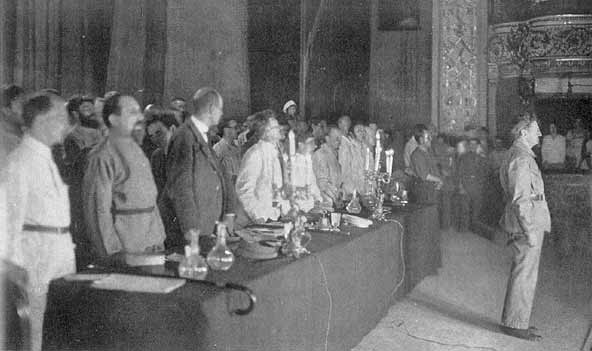February 1929-June 1929: Communist Revolution
Following mass secession and withdrawal from all foreign lands except northern Chile and Panama, William Z. Foster led the push through Congress to overthrow corporate and political monopolies over the working people and liberate the laborers, farmers, and hard-working Americans that deserve their nation back! The motion to nationalize key industries such as energy, food production, banks, and transportation under the
Great Turn Policy was overseen by Communist Party's large Russian influence, Joseph Stalin, who fled Russia following the fall of communism.
Immediately following nationalization, the Communist Party struggled to maintain the environmental standards of the Debs Era. Foster appealed before Congress that the few remaining corporations, and their far-stretching influence on American business, was setting back America from becoming a cleaner, healthier nation.
Under the Great Turn Policy, the Communist Party between February and June of 1929 met with world leaders to renegotiate trade relations. Following the collapse of American foreign territories, most resources could not be continued being exported, such as tea and fruit. Foster lifted the century old method of exporting resources for dirt cheap for the benefit of corporations. At a large rally in Washington in April, Foster gave an electric, energetic speech stating the overthrow of corporate influence and the benefit of all workers and citizens of these free, liberated United Socialist States!
After communist policies were established through Congress, Foster traveled the world. At his first stop in Lisbon, he met with Portugal and negotiated the hand-over of America's last territory back over to Portugal. Mozambique, captured from Portugal during the Victorian War nearly a century ago, coldly welcomed back Portuguese ownership. Nevertheless, Foster stated that Portugal was the only nation in the South African region that could keep the area from falling to capitalist extremists.
Peace was drawn out with Peru shortly after. President Foster wished for strengthened relations, and aid in the fight against the backstabbing, corporate-controlled Argentine government. The peace treaty was signed via radio signal during Foster's travel between Lisbon and Timbuktu.
Landing in the hot, arid deserts of Mali, Foster warmly greeted the Malinese Prime Minister. There Foster and the Communist Party outlined the re-established
Communist International. With large support from international communist parties, Foster continued his world travels signing into power communist parties. Among the nations during his world tour to successfully gain control of their government through the Communist International were Mali, Egypt, Arabia, Iran, India, Japan, Korea, Austria, Germany, Sweden, Portugal, and Brazil. An alliance was signed with Germany as well, as a threat to Russia to release political prisoners during the communist fall. Furthermore, Austria's communist overthrow frightened Russian officials as their client state drew closer to the Communist International, or Comintern.
Returning to Washington in the middle of the year, Foster's actions had already seen positive results. Pollution once again began falling to acceptable levels. World relations improved with countries that weren't at war with the USSA -- United Socialist United States, as Congress adopted in late May. Corporate influence had largely been defeated. By lowering culture from 50 to 40 and raising science to 60, Foster promised to revolutionize the airforce and regain air-superiority. In the following months, the Communist Party would then test their military prowess against the rebellion.















